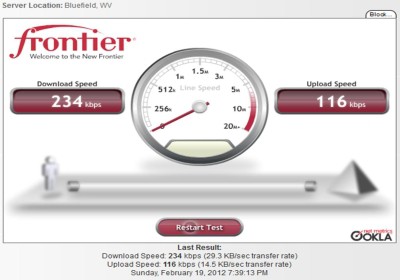
Phillip "Rural Georgia Isn't On AT&T's Mind" Dampier
Columbia County, Georgia has been talking about fiber optic broadband for two years — two years that the state’s largest phone and cable companies have not stepped up to provide suitable broadband to local schools, residents, and libraries. In 2010, enough was enough and the county applied for, and won, a $13.5 million Broadband Technology Opportunity Program grant to increase broadband and wireless access to the Internet throughout the area. Local taxpayers chipped in about $4.5 million in 1-percent sales tax dollars, and in-kind voluntary donations worth $2.3 million fulfilled the grant requirement that local matching funds be provided.
To residents long-suffering with satellite-delivered Internet, usage-capped mobile broadband, spotty DSL service, and frequent outages and slow speeds, a modern fiber network would help 120,000 county residents obtain the kind of broadband service people elsewhere take for granted. Columbia County’s rural character is evident when you consider it contains only two small incorporated cities and 91 percent of the population lives in unincorporated areas, making the eastern Georgia county an afterthought for big phone and cable companies who see better profits in bigger cities.
Now these companies, with the help of a campaign contribution-gorging state legislator, are intent on stopping projects even in areas they could care less about.

The News-Times captured this image from the groundbreaking ceremony for Columbia County's new fiber network in 2010. Big phone and cable companies would like them to run this picture again at the project's burial.
Columbia County’s local newspaper, the News-Times, is alarmed at the prospect of public tax dollars already spent on the project burned for the benefit of Big Telecom companies:
Republican State Sen. Chip Rogers, fueled by generous contributions from telecommunications companies, has filed a bill in the Georgia Legislature that, he claims, would protect private service providers from unfair competition by government-subsidized broadband systems.
Nonsensically, some in Columbia County welcomed the news as a slap at the county’s government. While we’re on record opposing the concept of the $13.5 million federal grant that allows the county’s entry into broadband, the fact remains that the project already is underway.
That federal program is designed to expand broadband Internet service to rural areas that, because of the up-front infrastructure costs, aren’t deemed profitable by private companies. Our county has plenty of those areas, served at best only by spotty, expensive cellular-based services.
Columbia County’s program wouldn’t compete with private companies. Instead, it uses the federal grant and local sale-tax funding to build that high-speed infrastructure, which private companies can then lease to provide Internet service to underserved areas.
Rather than undercutting local communities and sacrificing rural customers on behalf of the private companies, Rogers ought to look for ways to improve such public-private partnerships. Columbia County taxpayers had better hope so, too, unless they want all the money they’ve spent wiring the county with fiber optic cables to have been wasted.
SB. 313 is just another contract taken out on community-owned broadband networks that could deliver competition (and worse — far better service) to areas of Georgia where even conservative-minded voters wary of spending public money on anything are simply fed up with the status quo.

Columbia County, Georgia
So much for the Columbia County Broadband Network, a 220-mile, county-wide fiber middle mile network that will connect nearly 150 community anchor institutions and enhance health care, public safety, and government services throughout the county. Anchor institutions hoping to be connected at broadband speeds of 100 Mbps to 10 Gbps include K-12 schools, fire and emergency facilities, public libraries, Augusta Technical College, and the Columbia County Health Department. The project also planned to facilitate the creation of a high-capacity data center at the Medical College of Georgia, support a sophisticated county-wide traffic and water control system, and construct five wireless towers to enhance public safety communications as well as improve wireless communications capabilities throughout the region.
If Rogers’ bill passes, the county may have to go back to begging for access from the companies that have repeatedly said it wasn’t worth the investment or their time.
County officials have been more generous, offering all along to share access to the fiber network with the very providers who are seeking to destroy it. So far, that hasn’t changed any minds.
“If we don’t own it, that means we don’t want you to have it” is standard operating procedure for the state’s phone and cable operators, even in the service areas they routinely ignore, even if it means flushing millions of dollars already spent on new networks down the drain.
That’s money-fueled politics. State legislators with Big Telecom dollars in their eyes can’t see the 120,000 Columbia County residents waiting years for better broadband. Perhaps the best way to reach legislators in Atlanta is to condemn them to the same kind of broadband service local residents in Evans, Martinez, and Appling are forced to endure, if they have it at all.
 Subscribe
Subscribe












